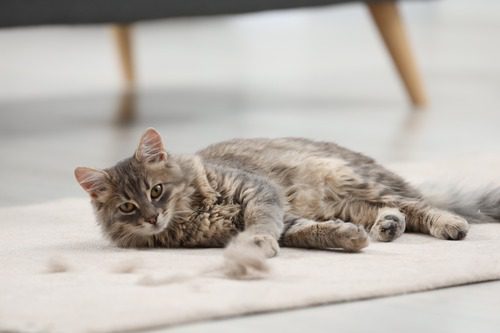Why is My Cat Losing Hair?
Cats are known for their sleek, shiny coats, so noticing patches of missing fur can be concerning. If you find yourself wondering, “Why is my cat losing hair?” you’re not alone. Hair loss, or alopecia, in cats can be caused by various underlying issues ranging from minor irritations to more serious health conditions. This blog will explore the potential reasons for a cat losing hair and help you determine when it’s time to visit an urgent care veterinarian.

Causes of Hair Loss in Cats
Hair loss in cats can stem from multiple factors, including medical conditions, behavioral issues, and external parasites. If your cat is experiencing hair loss, an urgent care veterinarian can help identify the root cause and recommend appropriate next steps.
Allergies and Skin Irritations
One of the most common reasons for a cat losing hair is a side effect to allergies. Cats can develop allergies to a variety of substances, including food, pollen, dust, and even household cleaning products. When a cat has allergies, it may excessively groom itself or scratch the affected area, leading to bald spots and skin irritation. Signs of allergies in cats:
- Excessive scratching or licking
- Red, inflamed skin
- Bumps or scabs
- Frequent ear infections
If you suspect your cat’s hair loss is due to allergies, an urgent care vet can perform tests to identify potential triggers. In many cases, adjusting the cat’s diet or environment can help alleviate symptoms.
Parasites: Fleas, Mites, and Ringworm
Fleas, mites, and ringworm can cause intense itching, leading to excessive grooming and bald patches.
Fleas and Mites
Fleas are a frequent culprit of feline hair loss. Even a single flea bite can trigger an allergic reaction in sensitive cats, resulting in significant hair loss and skin inflammation. Mites, such as those responsible for mange, can also cause severe itching and bald spots. Symptoms of flea or mite infestations include:
- Intense itching and scratching
- Hair loss around the tail, neck, or belly
- Scabs or open sores
- Tiny black specks (flea dirt) on the skin or fur
Ringworm
Unlike fleas and mites, ringworm is a fungal infection that leads to hair loss. It is highly contagious and can spread between pets and humans. Your urgent care veterinarian can diagnose ringworm through a fungal culture or a special UV light test.
Medical Conditions That Lead to Hair Loss
In some cases, hair loss in cats is a symptom of an underlying medical condition. If your cat is losing hair without excessive grooming or itching, a health issue may be the cause.
Hormonal Imbalances and Endocrine Disorders
Hormonal imbalances, such as those caused by hyperthyroidism or Cushing’s disease, can contribute to hair loss in cats. These conditions affect the body’s ability to regulate hair growth and skin health. Symptoms of hormonal imbalances in cats include the following:
- Sudden weight loss or gain
- Increased thirst and urination
- Changes in appetite
- Lethargy or restlessness
Feline Dermatitis and Skin Infections
Skin infections, including bacterial and fungal infections, can lead to hair loss in cats. Infections often develop as a secondary issue due to excessive scratching or open wounds. If you notice any of the following signs of skin infections, you should contact Frontier Veterinary Urgent Care:
- Red, inflamed skin
- Pus or discharge from affected areas
- A foul odor from the skin
- Pain or sensitivity when touched
Treatment for skin infections typically involves medicated shampoos, topical ointments, or oral antibiotics, depending on the severity of the condition.
Behavioral Causes of Hair Loss
Sometimes, a cat losing hair is linked to behavioral issues rather than medical conditions. Stress and anxiety can lead to overgrooming, a condition known as psychogenic alopecia.
Stress-Induced Overgrooming
Cats groom themselves as a way to stay clean and reduce stress. However, excessive grooming due to anxiety can cause hair loss over time. Stress-related hair loss is often symmetrical and occurs on easily accessible areas like the belly, legs, and sides.
Possible stress triggers for cats:
- Changes in the household, such as a new pet or family member
- Moving to a new home
- Lack of mental stimulation or environmental enrichment
- Conflict with other pets
Reducing stress through environmental enrichment, interactive play, and pheromone diffusers can help minimize overgrooming behaviors.
Signs That Indicate It’s Time to Seek Veterinary Care
While occasional shedding is normal, persistent or sudden hair loss requires veterinary attention. If your cat is losing hair along with symptoms such as itching, redness, skin infections, or behavioral changes, it’s time to consult an urgent care veterinarian. At Frontier Veterinary Urgent Care, our team can help diagnose the cause of your cat’s hair loss and recommend the best course of action. Call us at 262-226-2055 today.
